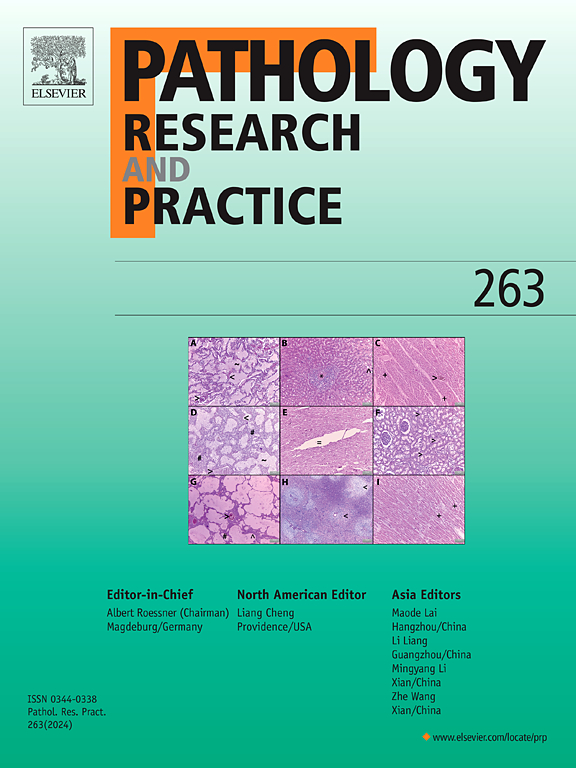利用E3连接酶治疗肺癌:dca - protacs的前景
IF 2.9
4区 医学
Q2 PATHOLOGY
引用次数: 0
摘要
肺癌仍然是癌症相关死亡的主要原因,强调迫切需要新的治疗策略。一种新兴的药物开发方法是通过泛素-蛋白酶体系统(UPS)靶向致癌蛋白,特别是通过靶向蛋白水解嵌合体(PROTACs)。在各种E3连接酶复合物中,由DDB1和cul4相关因子(DCAFs)组成的CRL4复合物因其在细胞稳态、DNA修复和肿瘤发生中的作用而受到关注。本文通过对介导crl4依赖性泛素化的底物受体DCAF13、DCAF15和DCAF16的研究,探讨了基于dcafc的PROTACs (dcafc -PROTACs)在肺癌中的治疗潜力。我们首先讨论了DCAF蛋白在肺癌中的失调,然后阐述了它们通过DCAF- e3连接酶复合物促进靶向特异性蛋白降解的机制作用。最近的研究表明,dcafc - protacs选择性地降解致癌蛋白,解决治疗耐药和肿瘤异质性问题。值得注意的是,DCAF13通过破坏p53来促进肺腺癌,而DCAF15-PROTACs则有效地靶向并降解RBM39。此外,针对DCAF16的亲电性PROTACs的开发为降解核蛋白提供了一条有希望的途径。尽管取得了这些进展,但在临床转化之前必须解决一些挑战,包括与药物生物利用度、稳定性和新出现的耐药机制有关的问题。这篇综述还探讨了联合治疗的潜力,特别是与免疫治疗,以提高肿瘤特异性和治疗效果。最终,dca - protacs的部署标志着精准肿瘤学的重大进步,为基于蛋白质降解的癌症治疗提供了一种新的靶向方法。本文章由计算机程序翻译,如有差异,请以英文原文为准。
Exploiting E3 ligases for lung cancer therapy: The promise of DCAF-PROTACs
Lung cancer remains the leading cause of cancer-related mortality, underscoring the urgent need for novel therapeutic strategies. One emerging approach in drug development targets oncogenic proteins via the ubiquitin-proteasome system (UPS), specifically through proteolysis-targeting chimeras (PROTACs). Among the various E3 ligase complexes, the CRL4 complex—comprising DDB1 and CUL4-associated factors (DCAFs)—has garnered attention for its roles in cellular homeostasis, DNA repair, and oncogenesis. This review explores the therapeutic potential of DCAF-based PROTACs (DCAF-PROTACs) in lung cancer by focusing on the substrate receptors DCAF13, DCAF15, and DCAF16, which mediate CRL4-dependent ubiquitination. We first discuss the dysregulation of DCAF proteins in lung cancer and then elaborate on their mechanistic role in facilitating target-specific protein degradation via DCAF-E3 ligase complexes. Recent studies show that DCAF-PROTACs selectively degrade oncogenic proteins, addressing treatment resistance and tumor heterogeneity. Notably, DCAF13 promotes lung adenocarcinoma by destabilizing p53, while DCAF15-PROTACs target and degrade RBM39 effectively. Additionally, the development of electrophilic PROTACs targeting DCAF16 presents a promising avenue for degrading nuclear proteins. Despite these advancements, several challenges must be addressed prior to clinical translation, including issues related to drug bioavailability, stability, and emerging resistance mechanisms. This review also explores the potential of combination therapies, particularly with immunotherapy, to enhance tumor specificity and therapeutic efficacy. Ultimately, the deployment of DCAF-PROTACs marks a significant advancement in precision oncology, offering a novel and targeted approach to protein degradation-based cancer treatment.
求助全文
通过发布文献求助,成功后即可免费获取论文全文。
去求助
来源期刊
CiteScore
5.00
自引率
3.60%
发文量
405
审稿时长
24 days
期刊介绍:
Pathology, Research and Practice provides accessible coverage of the most recent developments across the entire field of pathology: Reviews focus on recent progress in pathology, while Comments look at interesting current problems and at hypotheses for future developments in pathology. Original Papers present novel findings on all aspects of general, anatomic and molecular pathology. Rapid Communications inform readers on preliminary findings that may be relevant for further studies and need to be communicated quickly. Teaching Cases look at new aspects or special diagnostic problems of diseases and at case reports relevant for the pathologist''s practice.

 求助内容:
求助内容: 应助结果提醒方式:
应助结果提醒方式:


